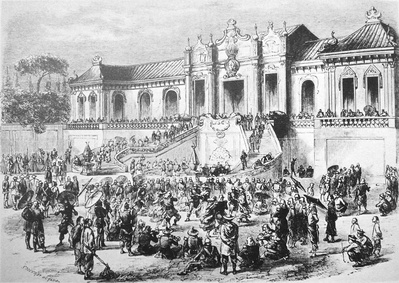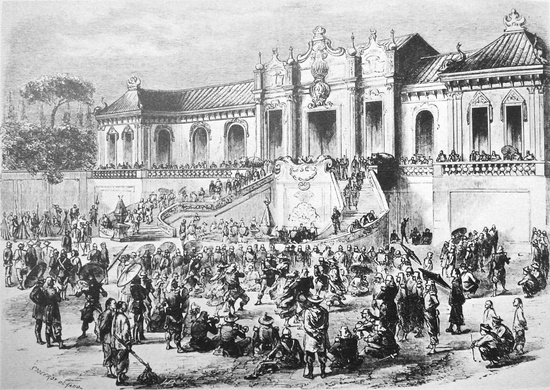
The Treaty of Nanking created more problems than it solved. Chinese resentment simmered for a long time and boiled over in 1856. Hostilities started when Chinese soldiers arrested the Chinese crew of the Arrow, a Chinese built and manned trading ship that had been registered in Hong Kong as a British ship and flew the Union Jack. Despite the fact that the British registration had lapsed, the British used the incident to justify retaliation. Thus began the second opium war.
The British began bombarding Canton in December 1856, and the Chinese retaliated by burning foreign trading factories, which escalated the tensions even more. The British opium merchants wanted to force China to accept free trade in opium, and Admiral Seymour, Harry Parkes (acting British Consul in Canton), and Sir John Bowring (Governor of Hong Kong) were itching for a fight. But they needed more troops. Again debate raged in the English parliament about the legitimacy of defending the opium trade, and again the war party prevailed.
Lord Elgin, who had been Governor-General of British North America at age 35, is sent to China to command the troops and resolve the issue. While Elgin is committed to a negotiated settlement, the British and French amass troops in the area, and when negotiations fail the shelling of Canton begins on 27 December 1857. After a messy period of war and negotiation, the European forces completely overpower the demoralized and poorly equipped imperial forces of China.
On 18 October 1860, British and French troops enter the Forbidden City in Peking and Prince Gong is forced to sign the Convention of Peking. This unequal treaty ratifies earlier treaties and legalizes the importation of opium to China and opens the country to foreign commercial practices and Christian missionaries.
Source: Hanes, T.W. & Sanello, F. (2002). The Opium Wars. Sourcebooks.
| Drugs: | Opium (morphine, heroin, opioids) |
|---|---|
| Regions: | China, France, UK (England, Scotland, Wales, Northern Ireland) |
| Topics: | Cultivation, production and trade, Drugs and war |
